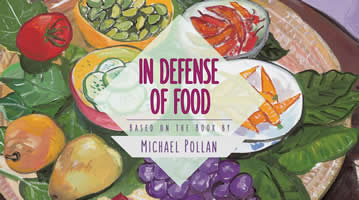On December 29, 2015, PBS aired In Defense of Food, a special based on journalist Michael Pollan’s 2008 book In Defense of Food: An Eater’s Manifesto. Throughout the special, Pollan focuses on ways to reverse the damage to people’s health resulting from today’s “industrially driven” diet. According to Pollan, these health changes occur because the majority of people eat a “Western diet” heavy in meat, white flour, vegetable oils and sugar, and, as a result, consume very little fruit, vegetables and whole grains. Pollan maintains people can live healthfully by following his seven-word motto: “Eat food. Not too much. Mostly plants.”
It is important to note the segment mostly shows foods such as white bread, donuts and corn dogs, and not many whole-wheat foods. Though Pollan states that white flour and bread are less healthy than their whole-wheat counterparts, he also stresses the health benefits of bread and wheat and the importance of eating a variety of foods.
The most relevant information and key takeaways for GFF from the special can be found below. The majority of the information is from minutes 8-20 in the segment.
Relevant Information for the Grains Industry
- The key ingredients in processed foods are corn, wheat, soybeans and rice, which do not cost companies much because government subsidies keep supplies high and prices low
- Agriculture today mostly focuses on seed crops like wheat, rice and corn, which provide the body with high levels of energy and protein
- Bread can consist of only a few basic ingredients: flour, water, yeast and salt
- Flour used to be made by grinding grains to produce whole-wheat bread that still contained both the grain’s bran and germ
- The whole-wheat bread was dense and hard to chew, and removing the bran and germ made the flour white and easier to eat
- White flour was a luxury few could afford until roller milling technology in the late 19th century made it easy to mass-produce and purchase, giving bread a longer shelf life, but making it less healthy because it eliminated the nutritious bran and germ of grains and contained mostly carbohydrates
- A white flour mill could feed millions of people, but the shift to white flour and processed corn and rice took a toll on people’s health and led to diseases like beriberi and pellagra
- The cause of these diseases remained unknown until the 20th century, when it was discovered that the average American diet had a lack of vitamins
- Wonder Bread began adding vitamins to its bread, and in a commercial claimed three slices had eight important elements, including protein, calcium and vitamins B-1 and B-2
- These vitamins needed to be added to bread because they had been taken out of flour
- Eating foods made with white flour results in excessive sugar intakes
- Though these foods are not made up of added sugar, they fill the body with carbohydrates that break down into glucose when we digest them
- This glucose triggers the release of a hormone called insulin into the blood stream
- Insulin lowers blood sugar, and too much sugar in the body may push insulin to the breaking point, causing diseases like type 2 diabetes
Additional Information
- The popular No-Fat fad diet has lasted in the country for 30 years and initially began when scientists started looking for the cause of heart disease
- As a result, people began eating a lot more carbohydrates
- Professors at Harvard’s School of Public Health issued a report that said the low-fat campaign had been based on little scientific evidence and that as people replaced fat with carbohydrates and sugar, the prevalence of obesity and type 2 diabetes grew dramatically
- At the turn of the 21st century, people began to think that protein was an evil nutrient
- The Kellogg brothers tried to turn away from the American diet of mostly protein — meat and eggs — and made carbohydrates the blessed nutrient by creating the morning cereal
- The cereal consisted mostly of carbohydrates and was originally made with wheat flakes and, later, corn flakes
Experts Featured
- Dr. David Ludwig, the author of the new book Always Hungry? Conquer Cravings, Retrain Your Fat Cells and Weight Loss Permanently, encourages a low-carb, low-glycemic diet and says obesity in children often leads to type 2 diabetes
- Joan Sabate, M.D. and professor at Loma Linda University’s School of Public Health, eats mostly plants and says he includes healthy carbohydrates such as pasta and bread in his meals
- In his research, Sabate has found that on average, vegetarians live at least three years longer than non-vegetarians
- Stephen O’Keefe, M.D., professor of medicine at the University of Pittsburgh Medical Center, studies colon cancer and says people in Africa who eat more vegetables, fruits and whole grains than people in the United States have much fewer incidences of colon cancer
- The reason for this is because plant-based foods contain fiber, which feeds bacteria in the colon and helps to keep it healthy
Conclusion
- Pollan stresses people can eat only healthy foods by following these food rules:
- Eat only foods that will eventually rot
- Eat only foods that had been cooked by humans
- Avoid foods you’ve seen advertised on television
- The government’s role in food policy should be to promote healthier food in a healthier environment driven mostly by a plant-based diet

